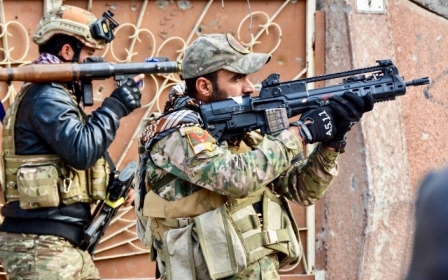Iraq forces retake 'Jonah's tomb' bombed by IS in Mosul

Iraqi forces battling the Islamic State group in Mosul on Monday retook an area where IS militants levelled one of the city's most well-known shrines in 2014, officials said.
"We retook control of Nabi Yunus area... raised the Iraqi flag above the tomb," Sabah al-Noman, spokesman for the Counter-Terrorism Service spearheading the Mosul offensive, told AFP.
He said two other neighbourhoods in eastern Mosul were also retaken from IS on Monday.
The Nabi Yunus shrine - which was built on the reputed burial site of a prophet known in the Quran as Yunus and in the Bible as Jonah - was a popular pilgrimage site.
In July 2014, weeks after overrunning Mosul and much of Iraq's Sunni Arab heartland, IS militants rigged the shrine and blew it up, sparking global outrage.
IS destroyed several other key landmarks in Mosul and elsewhere it considered as part of heretical rituals and practices.
Staff Lieutenant General Abdulghani al-Assadi, a top commander in the CTS, said "about 90 percent" of east Mosul was now under government control.
Closer to the Tigris
Commanders have said it would only take a few more days to flush out the last militants remaining on the east bank of the Tigris River than splits the city in two.
The destruction of all bridges over the river in air strikes has made it difficult for IS fighters in east Mosul to resupply or escape to the west bank, which they still fully control.
Clashes occurred in the Shurta and Andalus districts, where at least three IS suicide car bombs targeted Iraqi forces in Andalus.
Shurta and Andalus are situated close to the eastern bank of the Tigris, separated only by some woodland, and within sight of the city's northernmost bridge across the river.
Iraqi forces, which have reached three of the five bridges, say they will soon fully control the eastern bank. They have already taken areas of the river bank further south.
Once the east bank is recaptured, they can begin attacks on western Mosul, which the Sunni Muslim militants still hold.
Iraqi forces have seized most of the east in a three-month-old US-backed campaign to oust the militants from Iraq's second largest city, IS's last major Iraqi stronghold. The Tigris bisects Mosul from north to south.
A Reuters cameraman in a southern district along the Tigris said snipers from elite interior ministry combat units were firing across the river at IS positions.
Fighting has intensified since the turn of the year as Iraqi forces have renewed an offensive against the militants.
Troops had got bogged down in late November and December after entering Mosul as IS fighters fought back with car bombs and snipers, and concealed themselves among a civilian population of up to 1.5 million.
More people made homeless
The United Nations said a further 32,000 Mosul residents had fled the city in just over two weeks, bringing the total number of people made homeless in the campaign to retake Mosul to 161,000.
A resident in western Mosul, reached by phone, said IS combatants had stopped people living in the west from crossing the river to the east.
Another resident said a number of IS militants, including senior leaders in western Mosul, had left the city in the direction of Tal Afar, a town toward the Syrian border.
Shia Muslim militias have advanced on IS-held Tal Afar, and linked up with Kurdish fighters nearby in November.
The Mosul offensive, supported by US coalition air power, involves 100,000-strong combined forces of Iraqi troops, Kurdish peshmerga fighters and Shia militias.
As IS has lost territory in its Mosul bastion, it has carried out bombing attacks in Baghdad and raids on police and army outposts elsewhere in the country. Since the turn of the year, attacks in Baghdad have killed dozens of people.
New York-based Human Rights Watch said on Monday that Islamic State's bombings, which have targeted crowded markets, amounted to "crimes against humanity".
"(IS) has routinely carried out devastating attacks that appear designed to inflict maximum death and suffering on ordinary Iraqis," HRW said in a statement. It urged the Iraqi government to greater assist victims of militant attacks.
Middle East Eye propose une couverture et une analyse indépendantes et incomparables du Moyen-Orient, de l’Afrique du Nord et d’autres régions du monde. Pour en savoir plus sur la reprise de ce contenu et les frais qui s’appliquent, veuillez remplir ce formulaire [en anglais]. Pour en savoir plus sur MEE, cliquez ici [en anglais].




